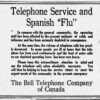In a short span of time, the COVID-19 virus has changed all of our lives significantly. Our schedules, our routines, our way of dealing with others (even friends and family) has been altered in a major way. It arrived suddenly, overwhelmed an unprepared population and left government officials scrambling to make decisions to slow the spread of the pandemic. All of which bear eerie similarities to the Spanish influenza a century ago.
Just as in 2020, the government issued orders to stem the spread. The Board of Health closed schools and theatres and, eventually, churches, pool halls and bowling alleys. Retail merchants – except for grocery, drug, stationery and book stores – were required to close shop at 4 p.m.
Civil servants were ordered off the job by 3 p.m. Major sports events were cancelled, including an international plowing match (despite the protests of organizers). Streetcars were required to keep ventilators open, limit passenger counts to the number of seats, and each were fumigated with formaldehyde daily.
(Sponsored)

Powered by passion, backed by Ontario Made: Turning bold ideas into entrepreneurial success
Back in the winter of 2018, a brutal cold snap dropped temperatures in Merrickville to -46°C. Michael J. Bainbridge and Brigitte Gall looked outside and told their holiday visitors to

The story behind Glenview Homes’ 2025 GOHBA award-winning Reveli floor plan
When Glenview Homes’ Design and Drafting Manager Eno Reveli sat down to design a new production floor plan, he wasn’t thinking about awards or show homes. He was thinking about

The Bell Telephone Company lost many employees to the flu. Yet with so many people ill and isolated at home, call volumes exploded, leading to a public warning to use telephones only when absolutely necessary.
Read the full column here.
Dave Allston is a local historian and the author of The Kitchissippi Museum. His Early Days column regularly appears in the Kitchissippi Times. Read the latest issue here.






